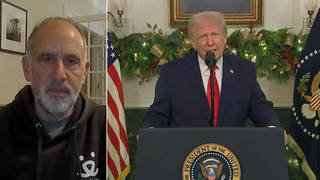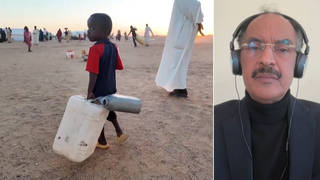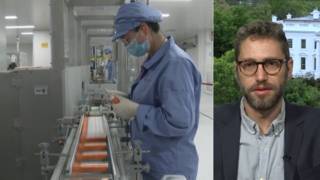
Pfizer’s contracts with countries like Brazil reveal how one of the world’s leading makers of COVID-19 vaccines has the power to silence governments, throttle supply, shift risk and maximize profits in the middle of a public health crisis. We speak with Public Citizen researcher Zain Rizvi, who examined the contracts in a new report out this week.
Transcript
AMY GOODMAN: This is Democracy Now!, democracynow.org, The War and Peace Report. I’m Amy Goodman, with Part 2 of our conversation about “Pfizer’s Power.” That’s the name of a damning new report by the consumer group Public Citizen that looks at how Pfizer has tried to silence governments, throttle supply, shift risk and maximize profits in the middle of a global public health crisis.
We’re continuing our conversation with Zain Rizvi, law and policy researcher for Public Citizen, author of this new report.
So, Zain, if you can talk about the power of Pfizer? And then we’re going to go on to Moderna, but we are talking about massive pharmaceutical companies that have made billions, with the support of public funding.
ZAIN RIZVI: Pfizer is expected to make $30 billion this year from the COVID vaccine alone. It’s going to be the highest-grossing pharmaceutical product in the history of pharmaceuticals on a yearly basis. And Pfizer has a monopoly on this life-saving vaccine. And so it has gone around the world extracting concessions from desperate countries. And so we see developing countries trying to push back, trying to fight back, but then having really no choice. And the people who could control Pfizer, the governments who have the leverage, the power, have simply not stepped up.
AMY GOODMAN: So, let’s talk specifically — let’s continue our discussion about Brazil. Tell us everything you know about the contract between Pfizer and Brazil. And we should let people know that part of the deal is that Brazil will not reveal these contracts.
ZAIN RIZVI: So, Brazil was one of the first and only countries to really speak out publicly about Pfizer’s negotiation tactics. Way back in January, Brazil complained publicly that what Pfizer was demanding was abusive and unfair. And yet, within two months, Brazil was back at the negotiating table with Pfizer and ended up signing a deal for a billion dollars that largely contained those same unfair and abusive terms. And so, it really shows the desperation of countries like Brazil when they need to get access to vaccine.
And one condition was added, actually, to the Brazilian contract that we have not seen in the other contracts. So, Brazil cannot speak about the contract, cannot even speak about its relationship with Pfizer, without the consent of the company. And so you had a situation in which one of the few countries which was outspoken in the beginning now has to go through Pfizer to talk about the contract.
And that’s not the only egregious provision in the contract. Brazil can also not accept donated Pfizer doses or even donate Pfizer doses without the permission of the company itself. And we see —
AMY GOODMAN: But now talk about the reasons for this. I mean, cannot accept in a time of a pandemic, when you want to get as much as you can possibly get so that your population will survive. They cannot get donated vaccines if Pfizer doesn’t want them to?
ZAIN RIZVI: Pfizer says that these provisions are designed to — you know, they’re mutually agreed. They are designed for purposes relating to liability, to making sure that Pfizer can keep track of, you know, where doses belong where. But it’s not hard to see how those very same provisions are deeply problematic and can be used in all kinds of really concerning ways.
We’ve actually seen the European Commission, for example, getting lobbied by the German government, who is now saying that some of the contracts that they’ve entered into with these pharmaceutical companies are just restricting the equitable distribution of vaccines around the world. And so they need to ramp up the pressure on these companies.
AMY GOODMAN: OK, can you talk about Pfizer securing an IP waiver, Zain?
ZAIN RIZVI: So, the head of Pfizer for a long time has ridiculed and mocked efforts to secure an intellectual property waiver at the World Trade Organization to freely share the vaccine recipe with the World Health Organization. And, you know, proponents — opponents of this often claim that IP does not matter. And yet, when you look into the contracts, you see that Pfizer is well aware of the risks of intellectual property.
And so, if Pfizer gets sued, for example, in Colombia over patent infringement, Colombia will be required to foot the bill. Pfizer can require Colombia to take control of the legal proceedings and defend the company, as well. And so, in a sense, you are seeing how Pfizer gets an IP waiver. Pfizer can use anyone’s intellectual property it pleases, but that same reciprocity is not built in.
AMY GOODMAN: Zain, you say in your report that Pfizer’s demands have been slowing purchase agreements, and even pushing back the delivery schedules of vaccines. I mean, we’re not talking about delivery of dresses here. We’re talking about a delivery of life over death. What does this mean?
ZAIN RIZVI: It’s outrageous. It really is a stunning indictment of our international intellectual property system, that empowers these corporations to make these kinds of decisions. No one corporation should be able to decide whether a sovereign government gets access to a life-saving vaccine in the middle of a pandemic.
And so, we have, for example, the Philippines and in South Africa, these negotiations between Pfizer and the countries went on for weeks. And the governments initially resisted. And as a result of those intense negotiations, you know, the contracts took longer to sign. And because the contracts took longer to sign, the eventual delivery of vaccines was also much slower.
AMY GOODMAN: So, you also say Pfizer can also go after state assets, that the U.S. government, in particular, can exercise the leverage it holds over Pfizer to require a better approach, empowering multiple manufacturers to produce the vaccine via technology transfer, and a TRIPS waiver can rein in Pfizer’s power. Explain what that all means.
ZAIN RIZVI: What it means is that we have created a system, about 25 years ago, that requires governments around the world to award monopolies to corporations over life-saving technologies, like vaccines in a pandemic, and that system is not working.
And so, what we need is governments with power, governments like the United States, to really step up and to tell Pfizer that “What you are doing is unacceptable, and that we are going to limit that power by empowering other manufacturers.”
And so, for example, the Biden administration can use the Defense Production Act to require Pfizer to share the vaccine recipe. Sharing the vaccine recipe could help other manufacturers around the world start ramping up production of the Pfizer vaccine, start ramping up production of this life-saving technology. And so, in a way, it takes that power away from Pfizer that allows it to go around the world and demand these kinds of conditions.
AMY GOODMAN: Can you talk about the profit that Pfizer has made? And, you know, a lot is made of — you have Moderna, that got massive infusion of funds — we’ll talk about that in a minute — but that Pfizer, I think the CEO, Bourla, said — who clearly despised Trump — “We never took a penny to develop this.” But that isn’t true.
ZAIN RIZVI: These are narrow distinctions that are made by corporate CEOs. But the reality is that if the Pfizer vaccine was authorized by the FDA, Pfizer was getting a huge upfront payment from the U.S. government, no matter what. It was going to be about $2 billion. And so, the U.S. government derisked some of the Pfizer vaccine.
And it’s also fundamentally true that the Pfizer vaccine is actually built on technology that was funded by the National Institutes of Health; in some cases, was developed by the National Institutes of Health. And so, the fact that we have these amazing vaccines is actually a testament to the work of publicly funded scientists over decades, actually. And so, there is no such thing as the Pfizer vaccine if there was no public investment in this kind of science from many years ago.
AMY GOODMAN: So, let’s talk about how the other major COVID mRNA vaccine maker, Moderna, faces growing pressure to share its vaccine recipe. The WHO, the World Health Organization, hired an African startup to try to figure out how to make one that’s as close as possible. Last week several U.S. Democratic lawmakers sent a letter noting Moderna got a massive infusion of U.S. taxpayer funds to help develop the vaccine, including at least a billion dollars just for research. The former scientific head of the U.S. COVID-19 vaccine response said the government, quote, “held Moderna by the hand on a daily basis.” The letter argued the Biden administration should use language in the government’s contracts with Moderna to force the company to divulge its process. So, explain what that would mean.
ZAIN RIZVI: Moderna is the story of a company that has benefited from U.S. public investment every step of the way. The company — the company’s name, Moderna, is based on “modified RNA.” Modified RNA is a technology that was funded by the National Institutes of Health. And that’s where the story starts, right? Like 10 years ago.
In this case, Moderna literally invented the vaccine in partnership with the National Institutes of Health. This is Tony Fauci’s team. Tony Fauci’s team was there helping Moderna invent the vaccine. And then another U.S. government agency, BARDA, put in a massive infusion of funding, more than a billion dollars, to scale up manufacturing and to help with research and development.
And so, as part of this contract, we found a provision that says that the U.S. government has unlimited rights to share data funded under the contract. And we think this appears to cover key manufacturing information. And so, if the U.S. government were to exercise these unlimited rights in conjunction with the Defense Production Act, we think the U.S. government could share the vaccine recipe, could help the African scientists who are trying to make the Moderna vaccine in the WHO hub right now, and really help scale up global production all around the world and bring the pandemic to a quicker end.
AMY GOODMAN: Finally, Zain Rizvi, what would be most important? What is the most important part of bringing this to a global end? What needs to happen?
ZAIN RIZVI: Look, there’s three things. One, we need to immediately share the doses that we have that are excess doses. It’s unconscionable that there are wasted doses in the U.S. as millions of people around the world haven’t gotten a single shot.
The second thing is we need to share the vaccine recipe. We need to quickly waive intellectual property rights at the World Trade Organization.
And then, finally, we need to make surge investments in global vaccine manufacturing capacity. Congress has allocated $2 billion in a markup by the House Energy and Commerce Committee, but we need to make sure that that remains in the Build Back Better package. And so we need Senator Schumer to ensure that there is funding for global vaccine manufacturing, so we can end this pandemic.
AMY GOODMAN: Would you say that campaign contributions make a big difference in how senators and congressmembers relate to the companies that are making these vaccines?
ZAIN RIZVI: It’s — you know, it’s that. It’s the lobbying. It’s the mirage of astroturf groups. But the people are with us. You know, if you look at Americans’ support for global vaccine manufacturing, for increased global vaccine donation, you consistently see that Americans understand that no one is safe until everyone is safe.
AMY GOODMAN: Well, on that note, I want to thank you so much for being with us, Zain Rizvi, law and policy researcher for Public Citizen. We will link to your report, “Pfizer’s Power.”
To see Part 1 of our discussion, go to democracynow.org. I’m Amy Goodman. Thanks so much for joining us.













Media Options